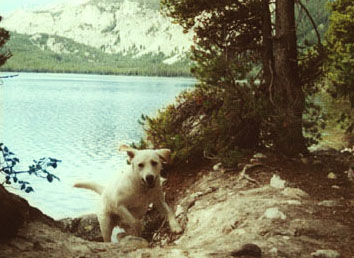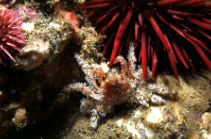William E. Avery
ACADEMIC INTERESTS/PHILOSOPHY::
 I have pursued
my graduate education with the intention of eventually returning to a university
such as CSU, Sacramento to teach General Biology, Ecology, Marine Biology,
Invertebrate Zoology and/or a variety of upper division courses. I truly
enjoy the Pacific Northwest (from California to Alaska). This bioregional
province is extremely diverse and interesting from an ecological perspective.
The mountains, forests, coastlines and ocean provide unmatchable arrays
of natural history learning and teaching opportunities. I plan to continue
to explore each of these ecological zones myself and sincerely enjoy the
opportunity to teach beginning students about them.
I have pursued
my graduate education with the intention of eventually returning to a university
such as CSU, Sacramento to teach General Biology, Ecology, Marine Biology,
Invertebrate Zoology and/or a variety of upper division courses. I truly
enjoy the Pacific Northwest (from California to Alaska). This bioregional
province is extremely diverse and interesting from an ecological perspective.
The mountains, forests, coastlines and ocean provide unmatchable arrays
of natural history learning and teaching opportunities. I plan to continue
to explore each of these ecological zones myself and sincerely enjoy the
opportunity to teach beginning students about them.
 As an ecologist,
one gains a sensitivity to issues of human impact on the environment both
at a local scale and at a global scale. Though I am very much a generalist
and have studied extensively both terrestrial and marine ecology, I am
particularly sensitive to issues involving aquatic systems as my research
and work have taken me around the world from temperate kelp forests to
tropical coral reefs and from shallow oceans to the deep sea. I am very
interested in environmental and ecological conservation but also in advancing
our understanding of biological and ecological processes. I am therefore
hoping to maintain at least a modest amount of ongoing research.
As an ecologist,
one gains a sensitivity to issues of human impact on the environment both
at a local scale and at a global scale. Though I am very much a generalist
and have studied extensively both terrestrial and marine ecology, I am
particularly sensitive to issues involving aquatic systems as my research
and work have taken me around the world from temperate kelp forests to
tropical coral reefs and from shallow oceans to the deep sea. I am very
interested in environmental and ecological conservation but also in advancing
our understanding of biological and ecological processes. I am therefore
hoping to maintain at least a modest amount of ongoing research.
I enjoy teaching undergraduates. I sincerely enjoy teaching basic biology
classes as well as more advanced biology and ecology courses. I am a firm
believer in involving students with the educational process (i.e. bringing
them into active discussion and involving them with research - particularly
questions they ask and studies that they design themselves!) rather than
a strict top-down lecture approach.
 Teaching is
my main interest in working within the academic environment but I hope
to maintain some research projects with which to involve my students. I
have experience with obtaining funding for research and look forward to
continuing such grantsmanship in the future. Potential research projects
may include but will not be limited to the following: long-term coral reef
and deep reef monitoring; intertidal monitoring;
marine larval supply side ecology; continuation of some of my gray-whale-feeding
research; general and specific paleontological studies; neotropical migrant
bird habitat and population monitoring. I am also committed to maintaining
a high academic standard including the application and understanding of
mathematics and statistics as it relates to biology and ecology.
Teaching is
my main interest in working within the academic environment but I hope
to maintain some research projects with which to involve my students. I
have experience with obtaining funding for research and look forward to
continuing such grantsmanship in the future. Potential research projects
may include but will not be limited to the following: long-term coral reef
and deep reef monitoring; intertidal monitoring;
marine larval supply side ecology; continuation of some of my gray-whale-feeding
research; general and specific paleontological studies; neotropical migrant
bird habitat and population monitoring. I am also committed to maintaining
a high academic standard including the application and understanding of
mathematics and statistics as it relates to biology and ecology.
Possible Future Research Interests:
Marine larval supply-side ecology. I have begun designing an
apparatus that will sample potential recruiting invertebrate larvae and
algal spores on a continual basis and provide instantaneous digital information
on abundances. By providing less-expensive, continuous monitoring and rapid
data analysis, this project may help shed some light on what has been termed
the "larval mystery phase" - a factor which may strongly influence the
development and succession in intertidal and subtidal communities.
Neotropical Migrant Birds. Populations of many songbirds continue
to decline in the United States. A simple monitoring program for populations
and habitat is fairly easy to establish and may be a great way to involve
undergraduates with an interesting beginning research project.
Coral reef ecology. Coral reefs are important regions of valuable
high biological diversity and yet they appear to be in trouble globally
due to over harvesting of associated fishes, increased coastal eutrophication
and siltation as well as increasing ultraviolet radiation. I would like
to maintain my involvement with coral reef studies through continued periodic
returns to monitoring sites established during my dissertation research
as well as participation in some of the new global coral reef monitoring
programs.
Deep reef ecology. My dissertation research has merely scratched
the surface of this potentially information-rich study area. I would like
to continue the process of determining the taxa present on the slopes of
the Great Bahama Bank (30 - 300m) and possibly start some experimental
tests of hypotheses explaining the high diversity present on these slopes.
I'd also like to find the deep-dwelling trilobites that deep-ocean marine
scientists jokingly long to see.
California Gray Whales. Continue work on determining the extent
and variation of offshore and estuarine benthic swarms of mysids, cumaceans
and amphipods as possible food sources for migrating or resident California
Gray Whales. Expansion and continuation of Craig Hawkinson's observations
and record keeping on resident and migrating Gray Whales.
Humpback Whales. Passive acoustic tracking of migrating pods.
This project would utilize existing US Navy submarine technology and vessels
as part of the US Navy's desire for cooperative ventures with civilian
academic research. Whales would be tracked passively using the forward
acoustic array. This would shed light on questions regarding migratory
behavior and the routes followed. The routes followed by humpbacks have
long been a mystery. This would be valuable to the Navy, cetacean research
and other researches such as those of Scripps global warming acoustic research
concerned about the location of Humpbacks (for their protection).
Beaver. I have two fairly well-developed proposals for beaver-ecology
research: a) pollen and phytolith stratigraphy of sediments impounded in
beaver dams and ponds as an indication of local vegetation community change
over decade and century time-scales; b) vegetation community comparisons
among riparian zones inhabited and not-inhabited by Castor canadensis
(introduced into Tierra del Fuego in 1945 and currently flourishing).
Horses. I would like to use carbon and oxygen isotope ratios
in tooth enamel to determine whether a dietary shift hypothesis might be
supported regarding late Pleistocene North American equids. This would
be a further exploration of the Pleistocene overkill hypothesis vs. climatic
shift hypothesis as explanations for the late Pleistocene demise of N.A.
equids and presumably other megafauna.
Avery (home page)
 I have pursued
my graduate education with the intention of eventually returning to a university
such as CSU, Sacramento to teach General Biology, Ecology, Marine Biology,
Invertebrate Zoology and/or a variety of upper division courses. I truly
enjoy the Pacific Northwest (from California to Alaska). This bioregional
province is extremely diverse and interesting from an ecological perspective.
The mountains, forests, coastlines and ocean provide unmatchable arrays
of natural history learning and teaching opportunities. I plan to continue
to explore each of these ecological zones myself and sincerely enjoy the
opportunity to teach beginning students about them.
I have pursued
my graduate education with the intention of eventually returning to a university
such as CSU, Sacramento to teach General Biology, Ecology, Marine Biology,
Invertebrate Zoology and/or a variety of upper division courses. I truly
enjoy the Pacific Northwest (from California to Alaska). This bioregional
province is extremely diverse and interesting from an ecological perspective.
The mountains, forests, coastlines and ocean provide unmatchable arrays
of natural history learning and teaching opportunities. I plan to continue
to explore each of these ecological zones myself and sincerely enjoy the
opportunity to teach beginning students about them.

 Teaching is
my main interest in working within the academic environment but I hope
to maintain some research projects with which to involve my students. I
have experience with obtaining funding for research and look forward to
continuing such grantsmanship in the future. Potential research projects
may include but will not be limited to the following: long-term coral reef
and
Teaching is
my main interest in working within the academic environment but I hope
to maintain some research projects with which to involve my students. I
have experience with obtaining funding for research and look forward to
continuing such grantsmanship in the future. Potential research projects
may include but will not be limited to the following: long-term coral reef
and